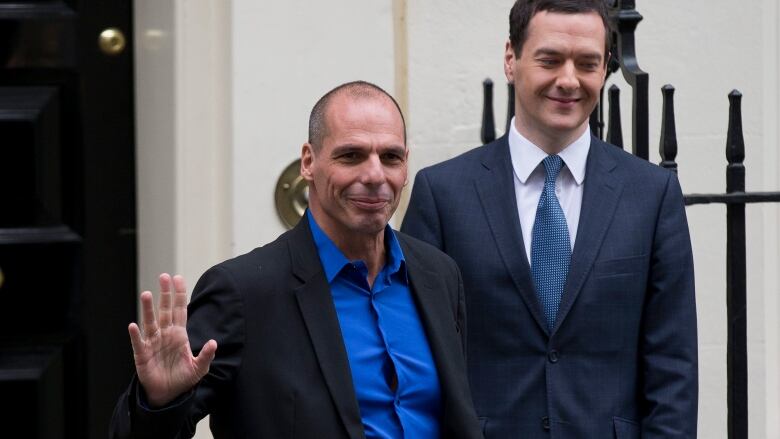Greek finance minister backs away from demands for debt writeoff
Yanis Varoufakis confirms he will hold meetings with chief lender, Germany

Hopes for a deal between Greece and its European lenders got a boost after the country's new government backed away from demands to write off a chunk of its bailout loans, a prospect that had horrified creditors and investors.
Greek stocks led a European market rally Tuesday after the finance minister said the new radical left government was willing to accept alternative strategies to making his country's debt load more bearable.
- Why Europe fears a Grexit more than a new bailout
- Alexis Tsipras, new Greek PM, vows to pay off debts
And in another development, the government confirmed it will hold meetings with lead lender and critic Germany this week.
Finance Minister Yanis Varoufakis said he will travel to Germany on Wednesday to meet European Central Bank President Mario Draghi in Frankfurt and German counterpart Wolfgang Schaeuble in Berlin the following day.
Signs of relief also came from the European Union, where the president of the executive Commission, Jean-Claude Juncker, said the bloc will "have to adapt a certain number of our policies" to accommodate Greece.
The Athens stock exchange was up 11.3 per cent in late afternoon trading and Greek bond yields eased, a sign investors are less worried about default. The Euro Stoxx 50 index of eurozone stocks gained 1.3 per cent.
Bonds for debt swap
The Financial Times reported that during a visit to London, Finance Minister Yanis Varoufakis had backed off the idea of a flat debt write-off. Instead, he suggested exchanging Greece's debt to its bailout creditors with bonds that would be repaid only if Greece's economy grows.
Varoufakis, who is on a European tour, also offered using so-called "perpetual" bonds which allow issuers to pay interest forever while foregoing the principal. That would be a less confrontational approach than the government's previous insistence on a write-off, which would have implied a cut in the face value of Greek bonds held by eurozone countries and the European Central Bank.
Historically, creditor countries have often written off debt owed by poorer nations. Greece's case is complicated, however, by the fact that it is part of a currency union richer countries like Germany do not want to set a precedent for other states that might get into financial trouble.
No comment from Germany
German Chancellor Angela Merkel refused to comment specifically on the bond proposal Tuesday, but did not reject it outright. She said there "will be sufficient opportunities" to discuss various proposals.
Greece has to strike a comprehensive deal with its creditors by the end of June, as otherwise it would be unable to repay some 7 billion($9.9 billion Cdn) worth of bonds maturing in July and August. Analysts say Greece needs a deal quickly to keep uncertainty from scaring off investors, hurting the already suffering economy and inducing depositors to pull money from banks.
As things stand, Greece's banks can use their government's bonds as collateral to tap cheap European Central Bank credit only until Feb. 28, when Greece's bailout program expires. After that, they would need to get emergency credit at higher rates from the Bank of Greece, though only with permission from the ECB.
Elected Jan. 25, Prime Minister Alexis Tsipras' government quickly riled creditors and investors with its insistence on a root-and-branch overhaul of its bailout, including the austerity budget measures that creditors had required. The government quickly froze privatization plans and reversed previous reforms.
"After a very rocky start last week, the new Greek government is faring better this week," said Berenberg Bank analyst Holger Schmieding. "The charm offensive of the new finance minister Varoufakis seems to be paying off in financial markets."
No deal yet on the table
The suggested bond swap would considerably ease Greece's debt burden. It would also prove a softer sell to taxpayers in Germany, the Netherlands and other European creditors.
JPMorgan Chase Bank analyst Malcom Barr said Varoufakis' comments indicate the government is admitting it may not deliver on all its pre-election promises. However, he warned that Greece and its creditors remain far apart.
"We still find it difficult to believe that the path toward an accommodation between Greece and the rest of the region will be at all smooth," he said.
Tsipras and Varoufakis were in Rome Tuesday for talks with government officials. Italian Finance Minister Pier Carlo Padoan said in a statement after meeting Varoufakis that Italy and Greece "are both convinced of the importance that Greece takes the path of strong and sustainable growth through a clear program of structural reforms."












_(720p).jpg)


 OFFICIAL HD MUSIC VIDEO.jpg)
.jpg)



























































































